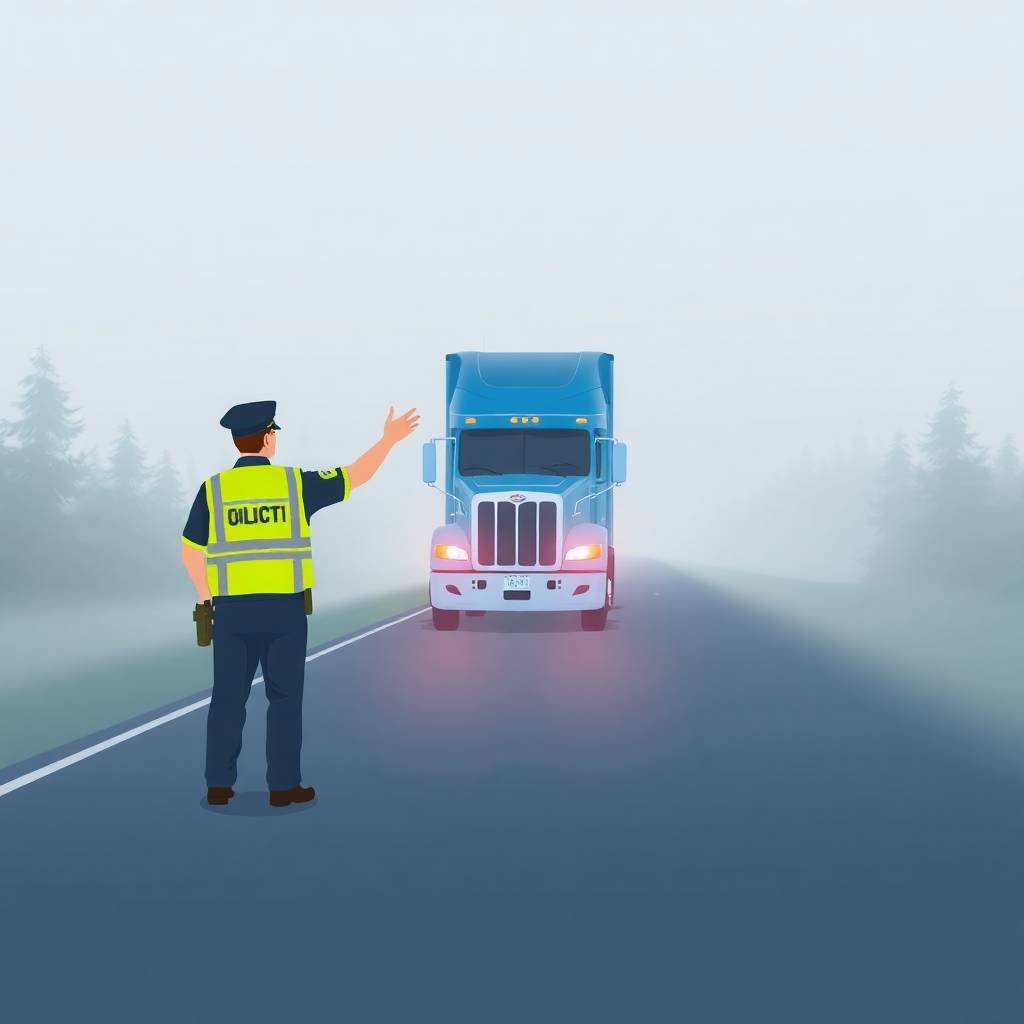1. Understand the Core of DOT Compliance Training for Drivers
For every motor carrier and commercial vehicle operator, DOT Compliance Training for Drivers is not just an industry requirement—it’s a critical element in ensuring safety, avoiding violations, and meeting FMCSA regulations. Whether you’re new to the industry or managing a fleet of experienced drivers, understanding the full scope of what this training involves is essential to sustainable operations and avoiding costly mistakes.
What Is DOT Compliance Training for Drivers?
DOT Compliance Training for Drivers involves structured education that teaches drivers how to comply with regulations from the Federal Motor Carrier Safety Administration (FMCSA) and the U.S. Department of Transportation (USDOT). This training covers topics like driver qualification file requirements, hours-of-service rules, pre-employment drug testing, and more. It is foundational for avoiding common FMCSA compliance mistakes that could result in fines or disqualification.
Key Elements of an Effective Compliance Program
A robust DOT Compliance Training for Drivers program includes several components:
- Drug and alcohol testing compliance
- Pre-trip and post-trip inspections
- Logbook and ELD usage
- FMCSA Clearinghouse compliance
- Understanding FMCSA Safety Measurement System (SMS) 2025
Training should also emphasize real-world applications, including the importance of staying current with the DOT compliance checklist and being audit-ready through DOT audit preparation.
Why Compliance Training Prevents Penalties
Failure to implement DOT Compliance Training for Drivers increases the risk of falling out of compliance with FMCSA regulations and USDOT standards. Many carriers only realize the value of compliance training after facing a DQ file violation or failing a random drug or alcohol test.
Don’t wait until a violation occurs. Proactive training and services like drug and alcohol testing management and driver safety score management help maintain your fleet’s safety and reputation.
Supporting Tools and Services
Our team at Truckers Compliance Hub offers a full suite of tools to complement DOT Compliance Training for Drivers, including:
- DOT compliance checklist for owner-operators
- How to correct FMCSA violations
- UCR filing deadlines
- IFTA, IRP, and BOC-3 support
- CSA intervention threshold insights
- New entrant safety audit survival tips
If you’re unsure where to begin, you can schedule your appointment here to discuss your training and compliance needs directly with a specialist.
Stay Ahead of FMCSA Requirements
The trucking industry is constantly evolving. Ensuring your team receives up-to-date DOT Compliance Training for Drivers is vital to remain compliant with the latest FMCSA compliance requirements for trucking companies and avoid setbacks.
We also recommend exploring our tailored support offerings for different operators:
- FMCSA compliance help for trucking companies
- FMCSA compliance services for owner-operators
- FMCSA compliance services for owner-operators (alternate)
Final Thoughts
Incorporating DOT Compliance Training for Drivers into your operations is a non-negotiable part of staying safe, legal, and competitive in the trucking industry. With the right tools and expert guidance, your drivers will not only understand regulations—they’ll know how to apply them effectively.
For more information, view our Disclaimer and Terms of Service to understand how our services and training materials support your business.

2. Stay Ahead of FMCSA Biennial Update Requirements
Understanding and staying compliant with the FMCSA Biennial Update Requirements is not optional—it’s a legal obligation for all motor carriers operating under a USDOT number. Ignoring or missing these updates can result in fines, deactivation of your DOT number, and disruption to your business. With the right support and a clear understanding of DOT Compliance Training for Drivers, you can stay ahead of regulatory deadlines and avoid costly mistakes.
Why the FMCSA Biennial Update Matters
The Federal Motor Carrier Safety Administration (FMCSA) mandates that all carriers must update their MCS-150 form at least once every 24 months, even if no information has changed. This update is crucial for maintaining active status with the FMCSA and ensuring accurate safety and operational data. Failing to meet this obligation can lead to penalties and unnecessary audits.
Maintaining compliance goes beyond just filing the form—it involves comprehensive awareness and adherence to broader FMCSA rules. That’s where DOT Compliance Training for Drivers becomes essential.
The Link Between Biennial Updates and DOT Compliance Training
DOT Compliance Training for Drivers helps carriers understand not only the filing process but also how the information on the MCS-150 interacts with broader compliance areas like DQ file requirements, drug and alcohol testing, and safety measurement systems.
Training ensures drivers and managers stay aligned with operational updates, especially in areas like FMCSA Clearinghouse compliance, random drug testing, and pre-employment testing.
Get the Right Tools to Remain Compliant
At Truckers Compliance Hub, we provide tailored services to help you meet the FMCSA Biennial Update Requirements and deliver complete DOT Compliance Training for Drivers. Explore tools like the DOT compliance checklist, DQ file monitoring, and DOT audit preparation to stay audit-ready.
Additional support services include:
- IFTA, IRP & BOC-3 filing support
- Driver safety score management
- UCR filing deadlines
- Correcting FMCSA violations
- New entrant safety audit survival tips
Schedule a Consultation and Stay on Track
Need help navigating your biennial update? Schedule your appointment today to speak with a compliance expert. Our team ensures you meet filing deadlines and maintain accurate records—all backed by industry-leading DOT Compliance Training for Drivers.
Avoid Costly Compliance Mistakes
Many carriers fall into avoidable traps due to a lack of structured training or oversight. Our resources help eliminate uncertainty through:
- DOT compliance checklist for owner-operators
- Drug and alcohol testing program management
- Guidance on FMCSA compliance mistakes
To stay informed, browse our latest posts or visit Transportation.gov for government updates.
More FMCSA Support and Compliance Services
We also offer specialized assistance through:
- FMCSA compliance help for trucking companies
- FMCSA compliance services for owner-operators
- Alternative compliance services for owner-operators
Final Thoughts
With accurate filing and DOT Compliance Training for Drivers, you’ll avoid pitfalls and strengthen your operational reliability. Stay ahead of the FMCSA Biennial Update Requirements and elevate your compliance readiness today.
For full transparency, see our Disclaimer and Terms of Service.

3. Prioritize Drug and Alcohol Testing Compliance in Your Training
In today’s fast-evolving transportation landscape, DOT Compliance Training for Drivers is more essential than ever. Among its many facets, drug and alcohol testing compliance stands out as a critical area that directly impacts safety, legal liability, and operational integrity. Ensuring that your training programs emphasize this area will help you avoid costly penalties, audit failures, and compromised safety ratings.
Why Drug and Alcohol Testing is a Compliance Priority
Drug and alcohol misuse is not only a safety concern—it’s a regulatory mandate enforced by the Federal Motor Carrier Safety Administration (FMCSA) and Department of Transportation (DOT). According to the FMCSA, carriers must implement a compliant drug and alcohol testing program that includes pre-employment, random, post-accident, and return-to-duty testing.
Training that highlights these procedures must be at the heart of any DOT Compliance Training for Drivers. This includes familiarizing drivers with random testing requirements, pre-employment DOT drug testing protocols, and driver-specific testing programs.
Integration into DOT Compliance Training for Drivers
To stay ahead, you must embed robust drug and alcohol testing modules into your driver training. Start by referencing the drug and alcohol testing compliance guidelines to structure your sessions. Cover everything from policies to procedures and ensure drivers are aware of their obligations under the FMCSA Clearinghouse rule.
Not only does this enhance compliance, but it also protects your company during audits. Consider our DOT audit preparation and drug and alcohol testing management services for ongoing support.
Minimize Risk of FMCSA Violations
Non-compliance with drug and alcohol testing requirements can result in severe penalties and affect your safety rating. Common FMCSA compliance mistakes stem from missing random tests or improper documentation.
A structured approach to DOT Compliance Training for Drivers reduces these risks. Use our driver safety score management tools and DOT compliance checklist to stay organized.
Training should also include how to correct FMCSA violations if they occur and understand the importance of monitoring DQ file violations.
Plan Ahead with Expert Support
A proactive strategy involves regular updates, training refreshers, and compliance reviews. Whether you’re preparing for an audit or managing new entrant safety audits, having a compliance partner can make all the difference.
Schedule your compliance consultation today and get expert advice tailored to your fleet’s needs.
Explore our full suite of services including:
- DOT compliance checklist for owner-operators
- CSA intervention thresholds guidance
- IFTA, IRP & BOC-3 support
- UCR filing deadline reminders
Stay Informed and Empowered
Access our latest articles and compliance updates to keep your training current. For official regulations, refer to Transportation.gov and the FMCSA site.
Need ongoing help? Check out:
- FMCSA compliance help for trucking companies
- FMCSA compliance services for owner-operators
- Advanced owner-operator services
Ensure your policies align with our Disclaimer and Terms of Service to stay protected.
Final Thoughts
Prioritizing drug and alcohol testing in DOT Compliance Training for Drivers ensures your business is legally sound, audit-ready, and safety-first. Don’t wait—reinforce your compliance training strategy and lead with confidence.

4. Master the Use and Maintenance of Driver Qualification Files
Proper handling of Driver Qualification (DQ) Files is a critical element of DOT Compliance Training for Drivers. These files not only serve as legal documentation of a driver’s eligibility to operate commercial motor vehicles but are also essential for maintaining compliance with FMCSA regulations. Ensuring that your fleet’s DQ files are accurately maintained is not optional—it’s a mandate that directly impacts audit outcomes and your company’s safety standing.
Understanding Driver Qualification File Requirements
A cornerstone of DOT Compliance Training for Drivers is helping carriers and drivers understand the specific driver qualification file requirements. These include a completed employment application, copies of licenses, medical certificates, motor vehicle records (MVRs), and documentation of previous employment verifications. The FMCSA requires these documents to be up-to-date and readily accessible during audits.
Failure to comply may lead to costly DQ file violations and can significantly harm your safety score, affecting both operations and insurance premiums.
The Role of DQ Files in DOT Compliance Training for Drivers
Integrating DQ file management into your DOT Compliance Training for Drivers ensures every member of your team understands the importance of recordkeeping. At Truckers Compliance Hub, we stress the need for accurate DQ documentation in all training sessions.
Training should also include insights from our DOT compliance checklist and modules on FMCSA compliance mistakes to avoid common pitfalls in file maintenance. A driver’s qualification directly influences your company’s Safety Measurement System (SMS) scores, which are monitored closely during audits.
Keeping DQ Files Audit-Ready
DQ files should be consistently reviewed and updated to reflect any changes in driver status, licensure, or employment. Use audit preparation services to ensure you’re ready for any compliance check. Our team at Truckers Compliance Hub also helps owner-operators with tools like the DOT compliance checklist for owner-operators.
Scheduling regular reviews of your DQ files is easy with a compliance consultation to keep you on track and audit-ready.
DQ Files and Broader Compliance Systems
DQ file management connects to other core components of DOT Compliance Training for Drivers. From drug and alcohol testing compliance and random testing requirements to pre-employment testing, each compliance measure relies on clean documentation.
These files also intersect with driver drug and alcohol testing programs and FMCSA Clearinghouse compliance, making them foundational to your safety record and legal compliance.
Support for File Maintenance and More
Beyond file management, your DOT Compliance Training for Drivers should also address topics such as driver safety score management, CSA intervention thresholds, and new entrant safety audits. Utilize our drug and alcohol testing management services to maintain program compliance.
Stay informed by exploring our latest articles and insights and browse valuable resources tailored for owner-operators and trucking companies.
For services like how to correct FMCSA violations, UCR filing deadlines, and IFTA, IRP, BOC-3 support, our compliance solutions are unmatched.
Final Thoughts
Mastering DQ file use and upkeep is a non-negotiable part of DOT Compliance Training for Drivers. With strategic training and expert resources, your team can maintain compliance and avoid regulatory setbacks. For more on our services, be sure to review our Disclaimer and Terms of Service to ensure a clear understanding of responsibilities and protections.

5. Train Drivers to Accurately Log Hours of Service (HOS)
Accurate logging of Hours of Service (HOS) is not just about avoiding penalties—it’s about safety, accountability, and staying ahead of federal mandates. One of the pillars of DOT Compliance Training for Drivers is teaching drivers how to properly manage their HOS logs. Failing to comply can trigger significant violations, increase audit risk, and jeopardize your operation’s standing with the FMCSA.
Why Accurate HOS Logging Matters
The Federal Motor Carrier Safety Administration (FMCSA) mandates that all drivers of commercial motor vehicles maintain precise records of duty status. These logs ensure that drivers comply with the maximum driving hours allowed and mandatory rest periods. Through DOT Compliance Training for Drivers, companies can reduce the risk of FMCSA compliance mistakes and improve fleet safety.
Inaccurate HOS records are a frequent cause of DQ file violations and can directly impact your FMCSA Safety Measurement System (SMS) scores, leading to interventions or audits.
Incorporating HOS Training into Compliance Programs
The best way to ensure ongoing HOS compliance is to make it a core focus of your DOT Compliance Training for Drivers. Every driver should understand how to log hours using ELDs, track rest periods, and avoid falsification errors. Our detailed DOT compliance checklist can serve as a reference point for ongoing education.
We also provide a targeted DOT compliance checklist for owner-operators, ideal for independent drivers managing their own records. For more in-depth support, consider scheduling a compliance consultation.
Preparing for FMCSA Audits
Inaccurate HOS logs can be a red flag during audits. Through expert DOT audit preparation, you can ensure that logs are consistent, accurate, and ready for inspection. HOS logging errors also often correlate with issues in driver qualification file requirements, so cross-training on these topics is vital.
Our new entrant safety audit survival tips are designed to guide new carriers through this process confidently and effectively.
Connect HOS Logging with Broader Compliance Needs
HOS compliance intersects with many other areas, including drug and alcohol testing compliance, random testing requirements, and driver safety score management. These all tie into a comprehensive DOT Compliance Training for Drivers program.
For example, an effective driver drug and alcohol testing program and clear understanding of pre-employment testing protocols are crucial elements in ensuring a compliant fleet.
Resources and Services for Compliance Success
Truckers Compliance Hub offers several services to support your compliance journey, including:
- How to correct FMCSA violations
- IFTA, IRP, and BOC-3 support
- UCR filing deadlines
- Drug and alcohol testing management
- CSA intervention thresholds
Explore more expert content through our compliance blog, or review our tailored solutions for owner-operators and trucking companies.
Compliance, Safety, and Legal Protection
When delivering DOT Compliance Training for Drivers, it’s essential to educate your team on the legal framework established by agencies like the U.S. Department of Transportation. Staying compliant protects both your drivers and your business.
Please take a moment to review our Disclaimer and Terms of Service to understand how we support your company’s legal and regulatory obligations.
Train your drivers to take HOS logging seriously—and empower them to do it right—with comprehensive DOT Compliance Training for Drivers from Truckers Compliance Hub.

6. Incorporate Real-World Scenarios in DOT Compliance Training for Drivers
Integrating real-world scenarios into DOT Compliance Training for Drivers transforms theory into practical understanding. This hands-on approach equips drivers to make informed decisions in the field, ensuring regulatory compliance, enhancing road safety, and minimizing costly violations. At Truckers Compliance Hub, we emphasize scenario-based training as a critical strategy for building a fully compliant and safety-driven workforce.
Why Real-World Scenarios Matter in DOT Training
The Federal Motor Carrier Safety Administration (FMCSA) enforces regulations that drivers must follow under real conditions—whether it’s navigating rest breaks, understanding HOS regulations, or reacting to roadside inspections. Real-world scenarios bridge the gap between regulatory theory and actual road situations, making DOT Compliance Training for Drivers more effective and memorable.
Using examples such as roadside inspection encounters, audit preparation events, or driver qualification file errors, trainers can simulate the types of decisions drivers must make under pressure. This not only boosts confidence but also strengthens long-term compliance.
Training Modules Built on Practical Examples
Scenario-based DOT Compliance Training for Drivers often includes simulations involving drug and alcohol testing. For example, drivers can be walked through a mock post-accident testing situation, referencing procedures outlined in the driver drug and alcohol testing program. They also learn how to properly navigate random testing requirements and understand their responsibilities during pre-employment screening.
Our training modules also incorporate scenarios from DOT audit preparation and highlight FMCSA compliance mistakes made by real drivers and carriers. These insights help reinforce best practices and prevent future violations.
Compliance Tools and Support for Real-World Challenges
At Truckers Compliance Hub, we offer a comprehensive DOT compliance checklist and tailored resources such as the DOT compliance checklist for owner-operators. These tools help ensure your drivers are trained not just in theory but in practice.
Real-world-focused DOT Compliance Training for Drivers also includes managing FMCSA Clearinghouse compliance, understanding driver qualification file requirements, and utilizing support services such as driver safety score management and drug and alcohol testing management.
If your team needs assistance adapting to real-world FMCSA requirements, explore our expert services for trucking companies and owner-operators.
Schedule a Customized Training Consultation
Every fleet is different, and that’s why a tailored approach works best. Schedule a free 30-minute consultation with our compliance experts to design a scenario-driven DOT Compliance Training for Drivers program that meets your needs.
For broader learning, check out our growing collection of industry-specific posts and stay informed about FMCSA safety measurement systems, CSA intervention thresholds, and new entrant safety audits.
Stay Legally Aligned with Federal Agencies
Ensure your training is aligned with regulations from the U.S. Department of Transportation and the FMCSA. Additionally, keep your documentation current with services like IFTA/IRP/BOC-3 support, UCR filing, and how to correct FMCSA violations.
Before implementing any training program, we recommend reviewing our Disclaimer and Terms of Service to understand our service policies.
By integrating real-world examples into DOT Compliance Training for Drivers, you equip your team with more than just information—you give them actionable knowledge to stay safe, legal, and efficient on the road.

7. Schedule Regular Training Refreshers to Reinforce Compliance Habits
In the transportation industry, maintaining compliance with federal regulations is a continuous process. That’s why scheduling regular training refreshers is essential. These sessions reinforce vital skills, prevent costly mistakes, and ensure ongoing DOT Compliance Training for Drivers. As federal rules and industry practices evolve, carriers must stay proactive in educating their drivers and compliance teams.
Why Frequent Refreshers Are Essential
Many companies treat DOT Compliance Training for Drivers as a one-time requirement. However, the Federal Motor Carrier Safety Administration (FMCSA) and the U.S. Department of Transportation frequently update their regulations. Without consistent refreshers, drivers may unintentionally fall out of compliance—leading to violations, audits, or worse.
Topics like driver qualification file requirements, random drug testing, FMCSA Clearinghouse compliance, and HOS logging require regular attention. Refreshers help reinforce the right procedures, foster safe habits, and promote a culture of accountability.
Key Areas to Reinforce During Training
A successful refresher program for DOT Compliance Training for Drivers should revisit crucial compliance categories, including:
- Drug and alcohol testing protocols
- DQ file violations
- CSA scores and SMS updates
- Audit preparation
- How to correct FMCSA violations
Trainers should use real-world examples and incorporate scenarios relevant to your operations. Referencing previous mistakes, as seen in this guide on FMCSA compliance errors, is a proven method to prevent repeat offenses.
Build a Structured and Sustainable Training Schedule
Regularly scheduled compliance training doesn’t have to be overwhelming. At Truckers Compliance Hub, we help carriers build structured and manageable training cycles. Our DOT Compliance Checklist for Owner-Operators ensures nothing falls through the cracks.
Whether you’re a fleet manager or an owner-operator, our services support consistent compliance through tools like UCR filing support, CSA intervention thresholds monitoring, and IFTA/IRP/BOC-3 assistance.
Partner with Compliance Experts
Need help creating a customized training program for your team? Schedule your free 30-minute consultation with our DOT compliance experts. We provide in-depth audit preparation, driver safety score management, and drug and alcohol testing management.
For a broader understanding of DOT Compliance Training for Drivers, review our additional resources on FMCSA compliance requirements for trucking companies and support specifically for owner-operators.
Explore Additional Resources
Explore our latest posts and compliance insights to keep your team informed. You’ll find comprehensive guides on topics like pre-employment testing, DOT audit survival tips, and drug and alcohol policy compliance.
We also encourage you to view our FMCSA compliance help for trucking companies and disclaimer to fully understand the scope of our services. For full transparency, refer to our Terms of Service.
Ongoing DOT Compliance Training for Drivers is not just a regulatory box to check—it’s a vital investment in your company’s success, safety, and future.

What is included in DOT Compliance Training for Drivers?

DOT Compliance Training for Drivers typically includes education on FMCSA regulations, Hours of Service rules, proper logbook usage, pre-trip inspection procedures, drug and alcohol testing policies, and Driver Qualification (DQ) file requirements. For comprehensive support in maintaining compliant DQ files, explore our DQ File Setup and Monitoring services, which are critical components of driver training success.
How often should drivers undergo DOT Compliance Training to stay current?

To ensure full compliance with federal safety standards, DOT Compliance Training for Drivers should be conducted at onboarding and repeated annually, or when major regulatory updates occur. Regular refreshers help reinforce key principles and prevent costly mistakes. For long-term compliance planning and audit-readiness, visit our DOT Audit Preparation page for resources tailored to training and evaluation.
Why is drug and alcohol policy education essential in DOT Compliance Training for Drivers?

Understanding DOT-mandated drug and alcohol testing procedures is critical for any driver subject to FMCSA regulations. DOT Compliance Training for Drivers should emphasize these rules to prevent disqualifications and violations. Our Drug and Alcohol Testing Management service offers full program setup and management to ensure your drivers meet training and compliance standards effectively.
Can DOT Compliance Training help prevent issues with IFTA, IRP, or BOC-3 filings?

Yes, effective DOT Compliance Training for Drivers should include an overview of regulatory paperwork like IFTA fuel tax reporting, IRP vehicle registration, and BOC-3 process agent filings. Training drivers to recognize and report potential compliance gaps early can prevent penalties. For expert filing help, our IFTA, IRP, and BOC-3 Support services are available to ensure these critical requirements are always met.
How does UCR filing relate to DOT Compliance Training for Drivers?

DOT Compliance Training for Drivers should include awareness of Unified Carrier Registration (UCR) filing obligations, especially for interstate operations. Educating drivers on what UCR is and why it matters can minimize misunderstandings and enforcement actions. For guidance on filing correctly and on time, our UCR Filing Assistance service provides reliable support to avoid common registration pitfalls.
Igor Iturriaga is a transportation compliance expert and founder of Dynamic 305 Miami LLC. He helps owner-operators and fleets stay FMCSA-compliant and audit-ready. https://www.linkedin.com/in/igor-iturriaga-64503217/
